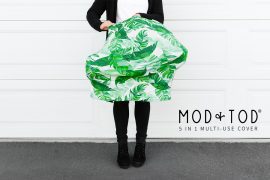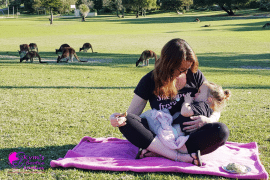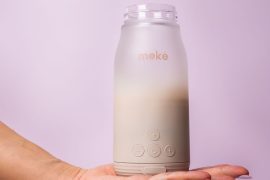Is this a mother with a supply problem?
No, it is not.
Her baby may continue to feed 2 hourly or even more frequently for a few months during the day, cluster feed at certain points and perhaps continue to wake a couple of times hungry at night. Her friend’s baby may settle into a pattern of feeding less frequently over a 24 hour period. This friend’s baby may not be receiving more milk overall.
When breasts are fuller, milk production slows. When breasts are emptier, we make more milk. When babies feed more frequently and from emptier breasts, they receive milk with a higher fat content. Frequent feeding has value. And as human milk has a fat content of around 3-5% compared to some mammals who have a fat content of 40% +, it seems pretty clear we’re designed as a species to need feeding more frequently.
When breasts are fuller, milk production slows. When breasts are emptier, we make more milk. When babies feed more frequently and from emptier breasts, they receive milk with a higher fat content.
But let’s imagine the mother with the smaller breast storage capacity has read this baby care book. She might become distressed that her baby still wants to feed 2 hourly. She might even try and stretch the interval between feeds in the mistaken belief this will increase her baby’s intake. And in doing so, her breasts spend longer at full storage capacity and their milk production slows and her breasts receive the signal to decrease milk supply.
So in her attempt to stretch between feeds as the advice she is reading suggests she does, she may actually be decreasing her overall milk production in 24 hours and be doing some actual harm.
So what should we suggest to this mum who never seems to be able to stretch her baby to longer intervals in the ways that her friends seem able?
First off, we should congratulate her for responding to her baby’s cues. Thankfully she knew not to try and impose some routine early on and therefore her milk supply is at its maximum capacity. Let’s check breastfeeding is otherwise going well: that feeds are comfortable for her, baby does settle for periods of contentment after a feed (though it may only be an hour or even less, rather than 3), weight gain and nappies are fine and latching and positioning is at maximum efficiency. If all this is true, and never reaching a magic ‘interval’ is her only concern, then we need to make sure she knows as much as possible about how milk production works. It is possible she is one of the mothers who has a minimal breast storage capacity and she will need to feed more in 24 hours to maximise the volume of milk her baby receives. And there might be nothing she can do about that. What happens next is about acceptance and support and attitude.
She has to keep that up for ideally around 6 months if her baby is going to get the full benefits of exclusive breastfeeding. She might need greater support with feeding outside the home – perhaps learning how to feed in a sling or experiment with different positions for different environments. It’s possible she may be woken at night more than her friend with the longer intervals – though we would expect night time intervals to be longer and for her to get a block of longer rest. She may benefit from support on safe bed-sharing practices.
She might need greater support with feeding outside the home – perhaps learning how to feed in a sling or experiment with different positions for different environments.
And it is just a matter of months. After solids have been established, patterns will change. It’s surprising what we can cope with for just a few months. We have jars of pickle in our fridge significantly older than that. We may even have toothbrushes that are around that long. In terms of an adult lifetime, it’s a blink of an eye.
What won’t help these mothers is the relentless message that they just need to stretch their baby a little more. That if they leave him to cry for 15 minutes, magically he will take more milk and life will change. That just isn’t what science tells us is true for all women.
Of course breastfeeding isn’t just about milk anyway. Apparently there are people who think that a baby comes to a breast primarily to get milk but I’ve not met a parent of a baby who thinks that’s true. Just as we don’t measure our sips of water, sweets and snacks, we also don’t measure every time our family smiles warmly at us, communicates with us, looks for comfort, hugs us, checks in, helps us to feel safe. No smart phone app can measure all the complexities of our relationship with our baby and all the things that responsive feeding can do. You are trying to count and measure love. That’s not going to achieve much other than a flat phone battery. And you could miss out on some magic that you can’t go back and live again.
And I’m talking about myself here, by the way. My children under 6 months never went longer than 2 hours between feeds in the day and not much longer at night. My red books record me feeding at 3 months every 90 minutes or so. So I learnt to feed while babywearing. I went to friendly groups and friendly places and met up with people at home. I read about safe co-sleeping practices which I know beyond a shadow of a doubt saved my bacon. And thankfully, I never felt anything was ‘wrong’. I just trusted my body. I trusted my baby and we worked as a beautiful team. I sat at home on the sofa and fed relatively frequently, enjoyed my box sets and my healthy and not-so-healthy snacks and that was OK. It really wasn’t for long. But the benefits of exclusive breastfeeding will be.
Why should a watch or clock tell me how to be a mother? I’d rather pay attention to my baby.
Sources:
Anatomy of the lactating human breast redefined with ultrasound imaging. DT Ramsay, JC Kent, RA Hartmann, and PE Hartman. 2005.
The magic number and long-term milk production. Nancy Mohrbacher IBCLC
Studies on Human Lactation: Development of the computerized breast measurement system. D.B Cox, R.A Owens, Peter E. Hartmann
Originally written 2011. Updated July 2016.
Emma Pickett is A qualified Lactation Consultant offering dedicated breastfeeding support in North London. You can find her at her Website, on Twitter or Pinterest.











The generational trauma from lack of being breast fed themselves and distorted teaching about breasting that today’s mothers and babies have inherited makes successful enjoyable breastfeeding elusive for many. Breast feeding is natural and is part of our sensual life for mother and baby. It is the only thing that the newborn’s body is designed to have to survive. Anything else requires a compromise. Women’s long term health requires the completion of the biological process that begins at conception followed by gestation, birth and lactation. We are all diminished when this process is not fullfilled. Its completion affirms the natural order that has seen us evolve. Love.
Wonderful, thank you for your insightful comment!
Thank you for writing such an honest article about breastfeeding. I have been doubting and questioning myself over the last month because of negative thinking and watching clocks.. thank you for the reminder to trust my body and my baby ☺
Fantastic article, thank you.